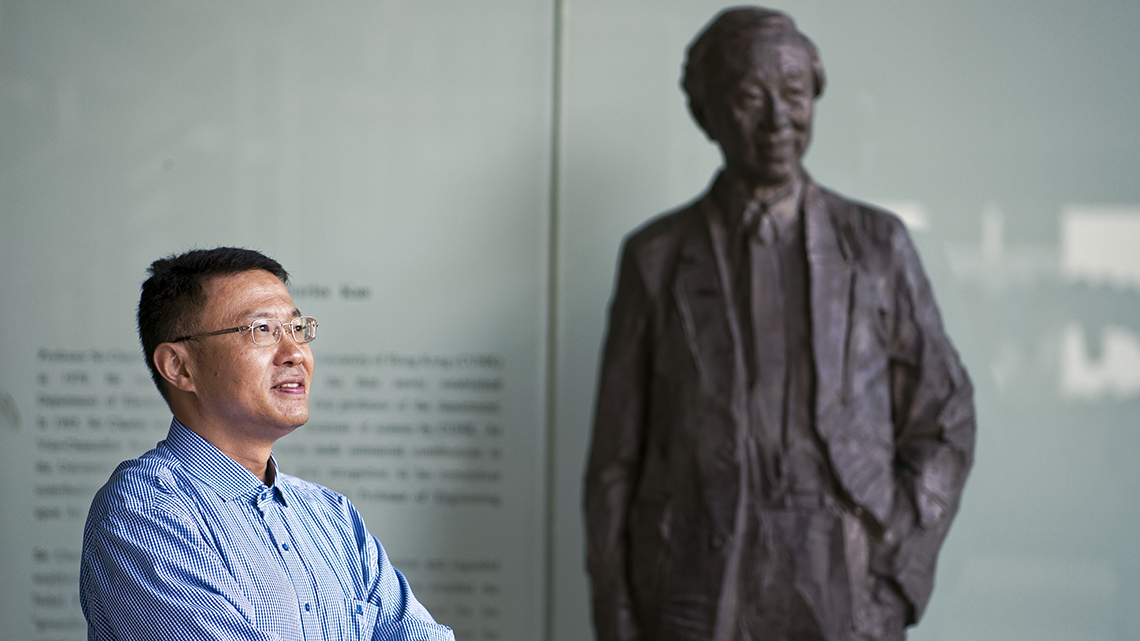Prof. XU, Jianbin Elected IEEE Fellow 2018
Prof. XU, Jianbin from the Department of Electronic Engineering, The Chinese University of Hong Kong (CUHK), has been elevated to Fellow Grade of the Institute of Electrical and Electronics Engineers (IEEE) since 2018. He is being recognized for his contributions to nanoscale electronic materials and devices.
The IEEE Grade of Fellow is conferred by the IEEE Board of Directors upon a person with an outstanding record of accomplishments in any of the IEEE fields of interest. The total number selected in any one year cannot exceed one-tenth of one-percent of the total voting membership. IEEE Fellow is the highest grade of membership and is highly recognized by the technical community as a prestigious honor and an important career achievement.
Prof. Xu is well known for his significant contributions to nanoscale characterization and nanomaterials, and more recently, nanoscale devices. In span of his entire research career he has been engaged in a number of challenging issues, namely exploring the heat transfer across a vacuum and an air gap down to submicron range which has significant implications on heat transfer in electron devices; finding the monoatomic step resolution by commercially-available atomic force microscopy (AFM) which opens up the field of AFM-based crystallography and AFM metrology, resulting in AFM being a routine characterization technique for surface inspection and precision engineering of a variety of disparate samples in academia and industry; understanding the electronic properties of ultrathin gate oxides for MOS transistors which are building blocks of the contemporary information and communications technology (ICT); developing an interface engineering strategy for graphene and two-dimensional semiconductors as well as organic semiconductors which hold a great potential for flexible electronics; just to name a few. The core of these apparently dissimilar developments is nanoscale adventure. This provides us with enormous unprecedented opportunities, as predicted by Prof. Richard P. Feynman — Nobel Laureate in 1965, saying that “There is Plenty of Room at the Bottom” in 1959.
Prof. Xu’s contributions have high impacts in nanotechnology and electron devices. He has published c.a. 400 peer-reviewed technical papers. He has over 7450 citations in Google Scholar, c.a. 5700 peer citations in Web of Science, as well as a myriad of citations by technical reviews, monographs, handbooks, and patents; among which 8 papers are classified as Highly-Cited Papers by Essential Science Indicators (the top 1% of the academic field of science and engineering). He has received twice the prestigious Young Distinguished Scholar Award (Overseas Chinese) by National Science Foundation of China (NSFC), and is a recipient of Chang Jiang Scholar Chair Professor by Ministry of Education (MoE) in 2014, a recipient of Research Excellence Award and Vice Chancellor’s Outstanding Fellow by CUHK. Meanwhile he is a prolific mentor: More than fifteen of his former students/postdocs now become faculty members or senior scientific officers in the mainland major universities and Hong Kong; One is currently Senior Technical Manager at Harvard University; One received the runner-up recognition of the Hong Kong Young Scientist Awards, a prestigious recognition among the tertiary institutions, and the Best PhD Thesis Award by Faculty of Engineering, CUHK. Four former team members have been selected as recipients of “National Thousand Youth Talents Program” (青年千人計劃), a nationwide highly competitive recruitment program.
